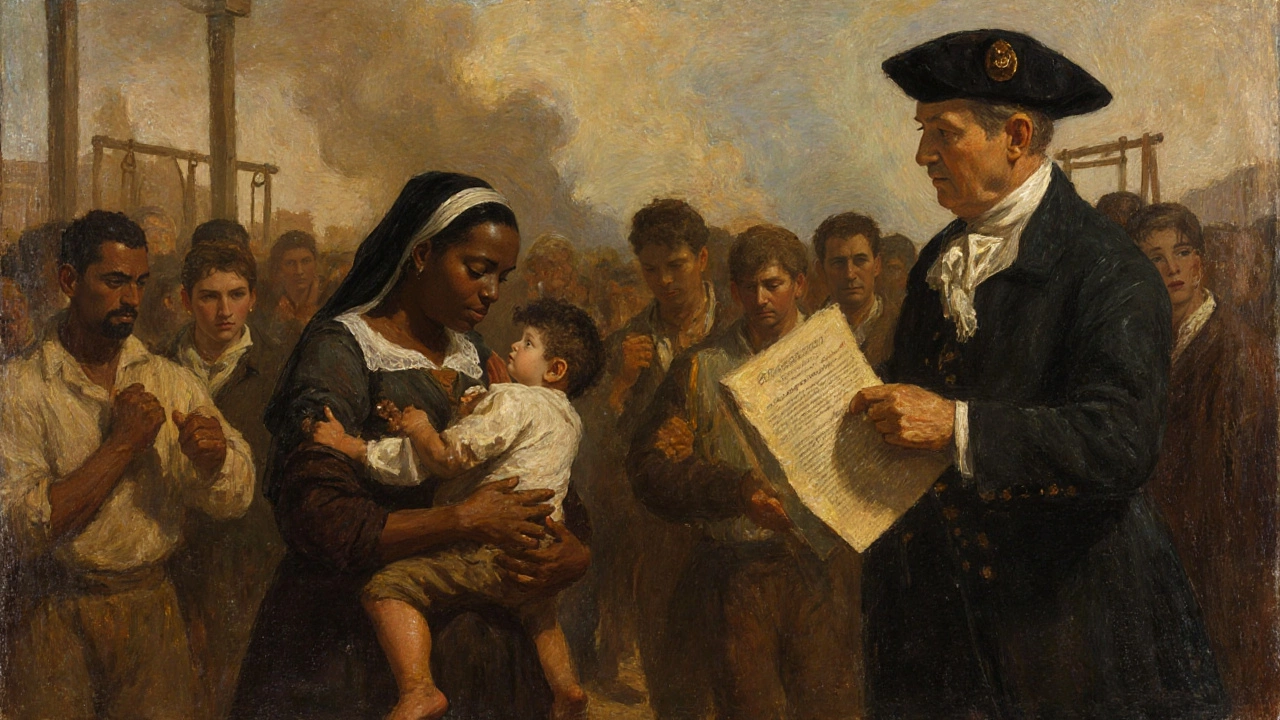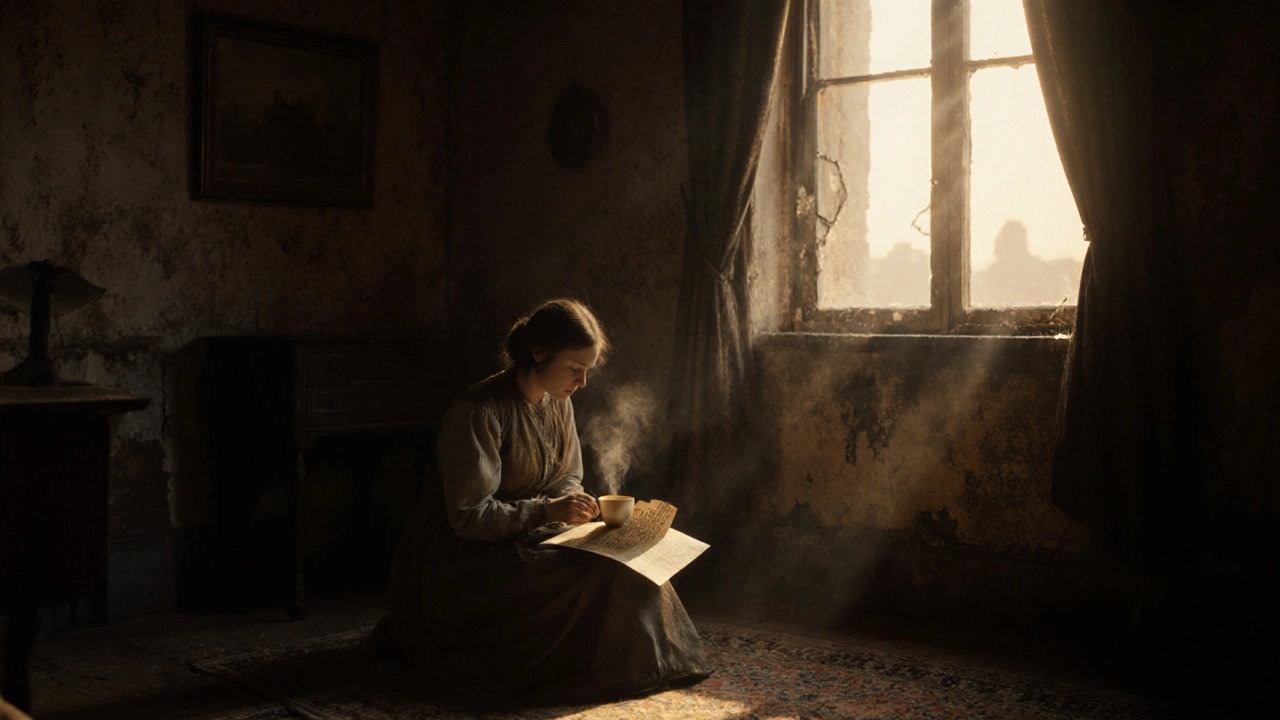Why do we keep reading stories about people who lived hundreds of years ago? Why do millions pick up a novel about a soldier in World War I, a servant in Victorian London, or a slave on a plantation in 18th-century America-when they could just read a textbook? The answer isn’t about accuracy. It’s not even about the past. It’s about us.
History doesn’t feel real until someone lives it
Textbooks give you dates, battles, and treaties. They tell you the what of history. But they rarely show you the how-how it felt to wake up hungry in a tenement, how fear tasted when you heard boots outside your door, how love survived when everything else was falling apart. Historical fiction fills that gap. It turns statistics into stomach knots. It makes a name like "The Great Famine" or "The Salem Witch Trials" into a daughter’s trembling hands, a mother’s silent prayer, a boy’s last letter home.
In 2023, a study by the University of Cambridge tracked readers of historical fiction and found that those who read novels set in the 1920s were 47% more likely to recall specific social conditions of the era-like rationing, gender roles, or class mobility-than those who studied the same period in a textbook. Not because the novel was more factual, but because it made the facts feel personal.
You don’t just learn history-you question it
History is written by the winners. That’s not a secret. But historical fiction doesn’t just repeat the official story. It asks: Who else was there? What did they see? What did they lose?
Think of novels like The Book Thief by Markus Zusak or Homegoing by Yaa Gyasi. These books don’t just show you what happened during the Holocaust or the transatlantic slave trade-they show you what it felt like to be erased from the record. They give voice to people history forgot. And in doing that, they force you to ask: Who’s missing from the history books I was taught? Why?
Historical fiction doesn’t pretend to be neutral. It takes sides. It picks a character who was powerless and lets you walk in their shoes. That’s not propaganda. It’s empathy. And empathy is the first step toward understanding why the past still matters today.
The past isn’t dead-it’s hiding in plain sight
When you read a novel set in 1840s Ireland, you’re not just reading about potatoes and emigration. You’re reading about how power works. How language gets controlled. How religion becomes a weapon. How families break under pressure. And those same patterns? They’re still here.
Look at today’s debates about immigration, national identity, or who gets to tell the story of a nation. The arguments haven’t changed. Only the names and the uniforms have. Historical fiction holds up a mirror. It shows you that the fights over borders, rights, and truth aren’t new. They’re just recycled.
Take The Night Watchman by Louise Erdrich. Set in 1953, it’s about Native American communities fighting a U.S. government bill that wanted to end tribal recognition. The book came out in 2020. The same bill, with the same language, was reintroduced in Congress in 2023. Historical fiction didn’t predict it. It just reminded us: this has happened before. And it will again.

It’s not about getting the details right-it’s about getting the truth right
Some people criticize historical fiction for "getting facts wrong." A character wears a dress that didn’t exist yet. A phrase was used decades later. A battle was moved a mile east. So what?
Historical fiction isn’t a documentary. It’s a feeling. It’s a mood. It’s the weight of a corset, the smell of gunpowder in a crowded alley, the silence after a child is taken away. Those details matter more than the exact shade of a uniform or whether a carriage passed that street on a Tuesday.
Authors like Hilary Mantel and Colson Whitehead don’t write to impress historians. They write to make you feel the ache of powerlessness, the quiet courage of survival, the way memory distorts over time. That’s the truth of history-not the calendar, but the human cost.
And here’s the thing: even when a novel bends the facts, it often reveals deeper truths than a textbook ever could. Take The Underground Railroad by Colson Whitehead. He turns the Underground Railroad into a literal train system. It’s not real. But it makes you feel the desperation, the danger, the hope of escape in a way no map of safe houses ever could.
It helps you understand yourself
When you read about a woman in 17th-century Salem accused of witchcraft, you’re not just reading about superstition. You’re reading about fear. About how communities turn on the different. About how easily blame is handed to someone who doesn’t fit in.
That same fear is in the headlines today. In the way minorities are scapegoated. In the way online mobs hunt for "guilt" before facts are known. Historical fiction doesn’t just show you what happened. It shows you what we’re still capable of.
Reading about the past isn’t an escape. It’s a mirror. It’s a way to ask: What parts of me come from that time? What biases did my ancestors pass down? What stories did my family choose to forget?
That’s why so many people say, "I didn’t like history in school-but I loved this book." It’s not because the book was easier. It’s because it made history personal. And personal things stick.

It keeps memory alive
Every generation forgets. That’s human. Wars end. Survivors die. Buildings fall. Archives get lost. Without stories, the past doesn’t vanish slowly-it disappears in a whisper.
Historical fiction is one of the last ways we keep those whispers loud. It’s how we remember the names of the people no one bothered to record. It’s how we honor the silence of those who couldn’t speak.
Think of The Song of Achilles by Madeline Miller. It takes a myth thousands of years old and makes you cry for a love story that was buried under epic poetry. Or The Poisonwood Bible by Barbara Kingsolver-where a missionary family’s collapse in Congo becomes a story about colonial arrogance, faith, and the cost of ignorance.
These books don’t just entertain. They rescue. They say: You were here. You mattered. We haven’t forgotten.
It’s not just about the past-it’s about the future
Why do we need historical fiction in 2025? Because we’re living through another turning point. Climate change. Political fractures. The rise of AI. The erosion of truth.
People are scared. They’re confused. They’re looking for answers. And the best place to find them isn’t in a news feed. It’s in a novel about people who lived through something just as broken.
Historical fiction doesn’t give you solutions. But it gives you something more valuable: context. Perspective. And the quiet understanding that we’ve been here before-and we survived. Not because we were perfect. But because we kept telling stories.

